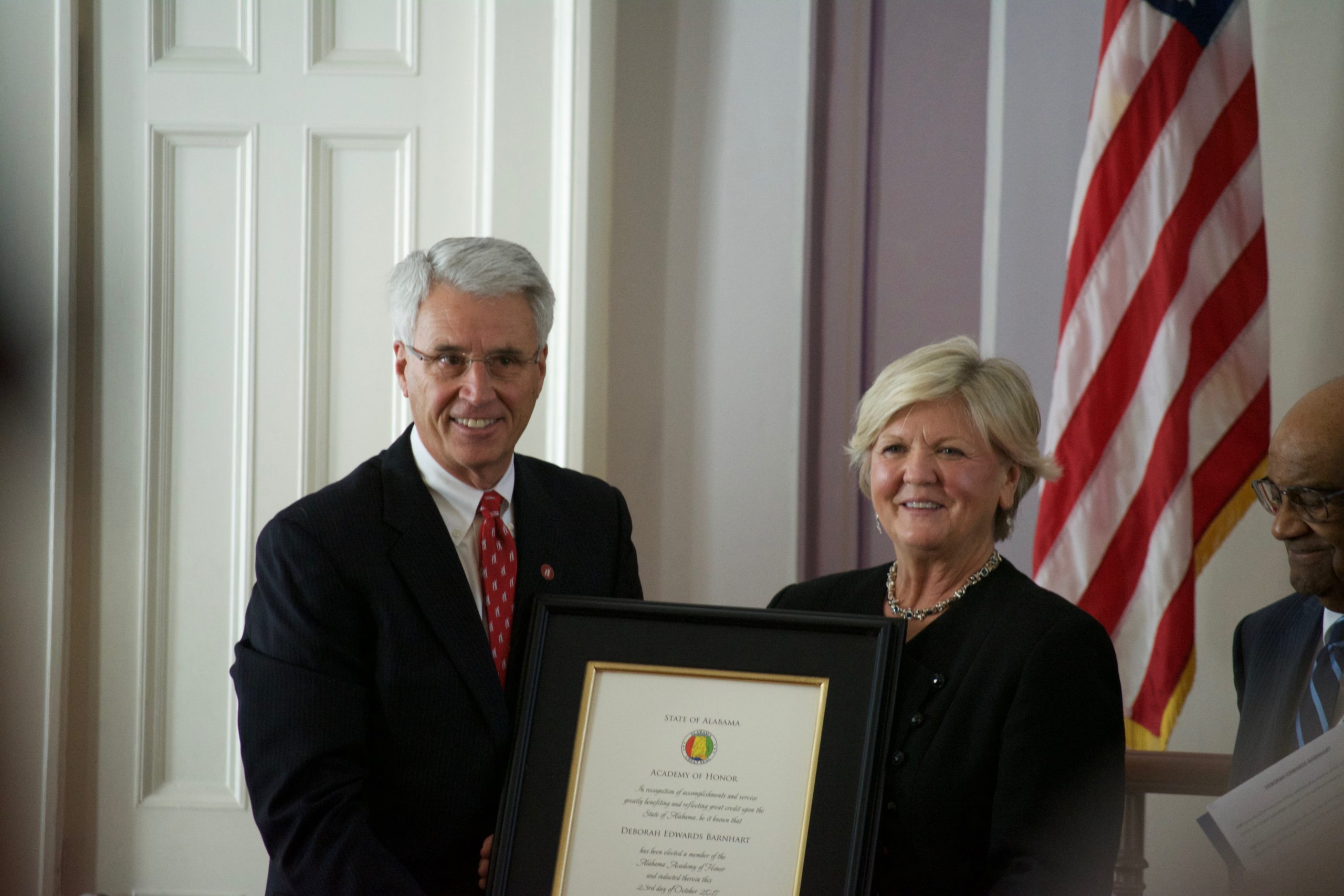One of the world’s most exceptional educational resources in the realm of science and space exploration has its home right here in Alabama, and its CEO is a woman who is herself an Alabamian.
Deborah Barnhart, Ed.D., has had a distinguished career spanning three decades in commercial industry, government, aerospace and defense. For the last seven years she’s been the CEO and executive director of the U.S. Space and Rocket Center, home to the renowned U.S. Space Camp, U.S. Space Academy, Aviation Challenge and Robotics Camp.
She’s been at the helm of the Space and Rocket Center for seven years, but it’s not her first job there. As a college senior in 1973, she helped with media, advertising and writing. She returned in 1977 to help with media when the space shuttle was flying into Huntsville on the back of a 747. She joined the Navy and returned to Huntsville in 1986 and served as director of Space Camp until 1990. She took over leadership of the center on the last day of 2010.
The center contains one of the largest collections of rockets and space memorabilia anywhere in the world. It is the state’s No. 1 tourist attraction, and expected to have 700,000 visitors by the end of 2017.
We asked her to talk about the center’s educational mission and how it serves the people of Alabama, both the current generations and the ones yet to come. – Allison Law
You get participants from around the world, but do you actively market and recruit participants from Alabama?
Oh, yes. We have two really important special programs. Every legislator in the state is allowed to send a boy and a girl in middle school through our Space Academy, which is a Space Camp program. We found that plenty of students were coming from the (metro) areas, but we (weren’t getting) children in the Black Belt and Wiregrass. So this program allows us to bring two students from every legislative district every year. We also have a program that allows us to send a teacher from every school district on scholarship every year to the teacher’s program.
Space Camp is probably the best-known of the camps, but talk about the other camps you offer for students.
Space Camp opened in 1982, and 800,000 alumni later it continues to grow. A few years after we opened, there was an extraordinary interest in people becoming pilots so they could perhaps become astronauts. So we started a second program called Aviation Challenge, which is still operating today. It’s like Space Camp, but like “Top Gun.” They have jet cockpit simulators, and they go down the slide wire as if they’re splashing into the ocean. It’s sort of a military experience to introduce students to the world of aviation.
Then a few years ago, we started Space Camp Robotics, which is very different than the other types you see. Our program allows the student to build and (maneuver) an airborne robot, like an unmanned aerial vehicle, a (more traditional) terrestrial robot, and an underwater robot. We’re trying to demonstrate the crosscutting nature of robotics.
We’ve done two pilot programs for the establishment of U.S. Cyber Camp, because cyber cuts across every industry in every aspect of our lives these days. We brought Alabama students in for our beta tests, and we will be opening that full-scale cyber camp in the summer of 2018.
Let me say a little bit about who comes to our programs, if that’s OK.
Yes, please do.
We’ve talked about Alabama, and that’s appropriate because I’m a commission of the state of Alabama, and my first responsibility is to serve the people of Alabama. But of course everybody’s interested in space, and our students typically come from at least 70 countries a year and all 50 states.
It’s a reflection on the prowess of Alabama, on the accomplishment that has come out of Alabama and the world’s respect for Alabama, for our technology. They’re sending their young people here to look at our programs and learn from us.
You inherited some financial challenges when you took over at the center, but it’s now on much more solid footing.
We are one of only 0.5 percent of museums in the world that are self-sustaining on our own revenue. The money we spend on operations, we earn on operations. We do, of course, have gifts, and we do have a foundation whose purpose is to provide money for educational programs at the Space and Rocket Center, but all that is below the line.
We do receive funds from the Alabama Education Trust Fund. Every dollar of the money that we receive from the state goes to a scholarship amortization for either a field trip for children coming from Alabama schools, an Alabama child or school group going through Space Camp, or for an educator who goes through our Space Academy. So every bit of that money that comes from the state goes back into scholarships for an Alabamian.





